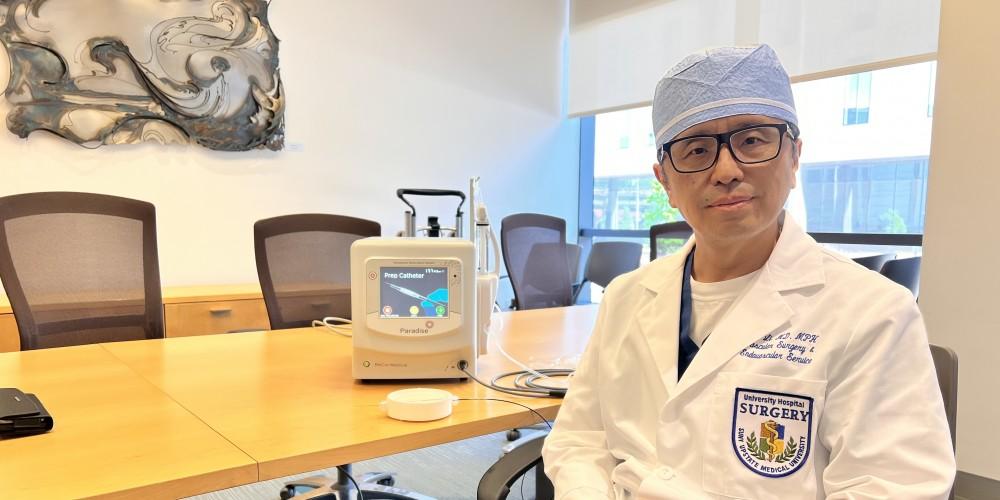Upstate is first in the region to offer an innovative procedure that aims to lower blood pressure in patients with uncontrolled hypertension
Upstate University Hospital is the first hospital in the region to offer an innovative procedure that aims to lower blood pressure in patients with uncontrolled hypertension.
Approved by the U.S. Food in Drug Administration (FDA) last November, the procedure, called ultrasound renal denervation (RDN), uses 360 degrees of circumferential ultrasound energy delivered through a balloon catheter to interrupt the activities of the nerves surrounding the renal arteries to reduce blood pressure. The procedure lowers blood pressure by denervating the sympathetic arteries of the kidney.
“Clinical trials have shown that renal denervation can be an effective option for individuals with uncontrolled hypertension,” said an Upstate vascular surgeon Wei Li, MD, MPH, who also has appointments with the Syracuse VA Medical Center and in the Division of Nephrology and Hypertension at Texas Tech University Health Sciences Center. “For some, changes in lifestyle and medications aren’t enough to combat this health condition that can lead to significant complications, but now we have an advanced treatment to help them.”
Li performed Upstate’s first renal denervation procedure April 15 on a male with elevated blood pressure.
The patient had a blood pressure of 193 over 89 before the procedure, but despite taking four medications could not get the reading lower than 184 over 86. He also had numerous aortic pathologies making him an ideal candidate for renal denervation.
After the procedure, the patient’s blood pressure dropped to around 120 over 70 and he was able to reduce his blood pressure medications and their side effects significantly.
The procedure is performed on a hospital outpatient basis and lasts about an hour. The patient may be given local anesthesia, but is awake and alert. In a catheterization lab, doctors, guided by ultrasound and X-ray, insert a tiny catheter through the groin into the renal arteries and use ultrasound energy to interrupt the activity of the renal nerves that cause hypertension.
When many other interventions to lower blood pressure have been tried to little effect, renal denervation can provide the lower blood pressure relief needed by the patient to ward off other serious health complications, Li said.
Tens of millions of Americans have high blood pressure and many do not know it. In the United States, high blood pressure or hypertension is considered to be 130 systolic pressure and over 80 diastolic pressure. Hypertension can put one at risk for heart disease and stroke, so individuals must control their blood pressure.
Patients who would most benefit from renal denervation have one or more of the following:
—Are taking three or more blood pressure medications at maximum dosage, including diuretics, and blood pressure readings still show greater than 130 systolic pressure over 80 diastolic pressure;
—Exhibit poor medication adherence.
—Have uncontrolled hypertension and already have suffered a stroke, or heart attack, has significant coronary artery or reduced renal function.
Li is a principal investigator of the Global Paradise System Post Approval Study, which is an observational study for the manufacturer of the medical device used in the study, the Paradise Ultrasound RDN System.
According to ClinicalTrials.gov, hypertension patients who meet the study eligibility criteria will undergo the ultrasound renal denervation procedure using the Paradise System and will be asked to measure their blood pressure (BP) throughout the study, including measuring BP out of the clinic setting using a home BP monitoring device provided by the study. Participants will also be asked to answer some questions about their quality of life, health, sleep and emotions. Additional demographic data, medical history and socio-economic data may also be collected. As part of the study participation, everyone who receives ultrasound renal denervation will be seen by the study doctor and designated study team members for 60 months (5 years) following the procedure.
Li was the first vascular surgeon in the world to do an ultrasound renal denervation since the FDA approved this technology, according to a global database.
In an article, published this month in Renal Interventions, Li and Aiyu Zhao of the VA Medical Center in Syracuse, wrote: “Renal deneveration holds promise, its adoption may exacerbate the above existing health inequities among the current hypertension populations due to disparities. Vulnerable groups may face barriers to accessing this advanced therapeutic option for uncontrolled primary hypertension. Addressing these factors requires a multifaceted approach involving healthcare providers, community stakeholders, and policy and lawmakers to ensure equitable access to RDN and comprehensive hypertension management among underserved and vulnerable populations, including veterans.”
Caption: Vascular surgeon Wei Li, MD, MPH, performed Upstate's first renal denervation procedure last month.

